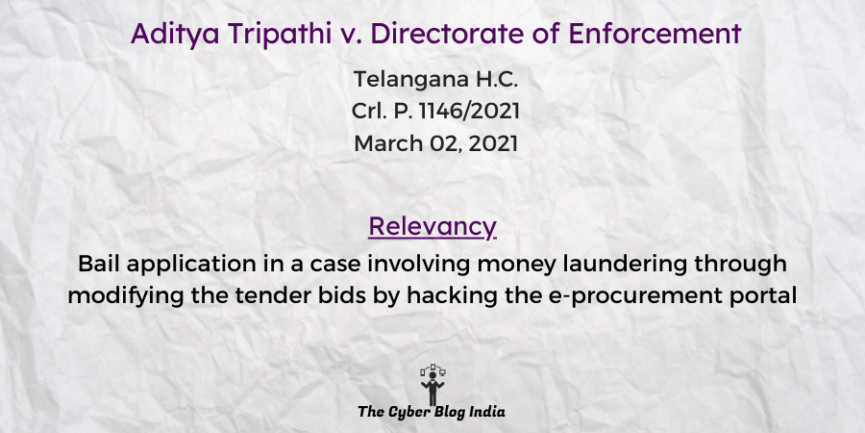Aditya Tripathi v. Directorate of Enforcement

Aditya Tripathi v. Directorate of Enforcement
In the High Court of Telangana
Crl. P. 1146/2021
Before Justice G. Sri Devi
Decided on March 02, 2021
Relevancy of the Case: Bail application in a case involving money laundering through modifying the tender bids by hacking the e-procurement portal
Statutes and Provisions Involved
- The Code of Criminal Procedure, 1973 (Section 437, 439)
- The Prevention of Money Laundering Act, 2002 (Section 3, 4, 43, 44) (“PMLA”)
- The Indian Penal Code, 1860 (Section 120B, 420, 468, 471)
- The Information Technology Act, 2000 (Section 66)
- The Prevention of Corruption Act, 1988 (Section 7(c), 13(2))
Relevant Facts of the Case
- The case involves unauthorised access to three Madhya Pradesh Water Corporation tenders on the Madhya Pradesh e-Procurement Portal, which MPSEDC manages and has contracted to Antares Systems Limited and Tata Consultancy Services.
- The initial investigation uncovered tampering with e-tender numbers 91, 93, and 94, amounting to ₹ 1769 crores, in favour of specific companies as the lowest bidders. Also, accused persons manipulated tenders from various government departments to benefit specific applicant companies.
- Someone hacked the e-portal system of MPSEDC, changing the price bid of applicant companies by using Digital Signature Certificates belonging to the Tender Opening Authority. The unauthorised access occurred through IP Addresses associated with the Marketing Director of Osmo IT Solutions Private Limited.
- The Digital Signature Certificates (DSC) were made by e-Mudra Registering Authorities.
- The accused collaborated in a criminal conspiracy to manipulate e-tenders awarded by the Madhya Pradesh Government to gain illegal benefits. The estimated amount involved is Rs. 80,000 Crores.
- The investigating agency looked into e-tenders awarded from 2016. It has not determined the suspected amount of proceeds of crime yet.
- The documents suggested a prima facie case for an offence of money laundering under Section 3 of the PMLA, punishable under Section 4.
- The police have charged the accused under the provisions mentioned above. The petitioner has filed this criminal petition under Sections 437 and 439 of the Code of Criminal Procedure, 1973. The petitioner seeks bail for the offence of money laundering, as defined in Section 3 of the PMLA.
Prominent Arguments by the Advocates
The petitioner’s counsel:
- The petitioner is not an accused but only a suspect until the agency files a complaint under Sections 43 and 44 of the PMLA.
- The counsel emphasised that the arrest lacked justification since there were no specific allegations against the petitioner. The claim that the petitioner tampered with evidence was false, as the respondent had custody of the documents and electronic devices.
- The Supreme Court, in the cases of Sanjay Chandra v. CBI and Kailash Gour v. State of Assam, has stated that an accused should be presumed innocent unless proven guilty. Jail is an exception.
The respondent’s counsel:
- TLegal precedents from the Supreme Court and High Courts emphasise a reluctance to grant bail in cases involving economic offences, considering these offences against the nation.
- Section 45 of the PMLA imposes stringent conditions for granting bail in money laundering cases, making the present bail application not maintainable and liable for dismissal.
Opinion of the Bench
- Offences under the PMLA are serious in nature. These are the crimes that directly impact the nation’s economy. Moreover, there is also a pressing need to prevent obstructions to the investigation.
- However, the law does not prohibit granting bail to the suspects of money laundering offences. Section 19 provides for the power to arrest based on reasonable belief. The provisions of the Code of Criminal Procedure, 1973 also apply.
- At the same time, economic offences require a different approach to bail considerations. A court needs to balance factors such as the nature of accusations, severity of punishment, an accused’s character, and the likelihood of interference with witnesses.
- The respondent’s counter-affidavit indicated substantial progress in the investigation. The petitioner’s lack of cooperation in the investigation should not be the sole reason for denying him bail.
Final Decision
- The bench granted the bail application.
